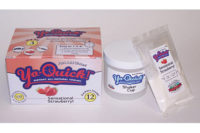Probiotic-containing dairy products are gaining in popularity and consumers put their trust in these products, assuming they will receive the probiotic effect the package promises.
Not all products deliver on their promises, however, according to Mary Ellen Sanders, MS, PhD, consultant, Dairy & Food Culture Technologies, and executive director, International Scientific Association for Probiotics and Prebiotics. Independent testing discovered that some probiotic products don’t contain what is claimed, said Sanders. In addition, some claims aren’t backed by enough evidence to support the benefit of that particular probiotic strain.
Working with probiotics is no easy task for probiotic suppliers and dairy processors. In terms of technology, the biggest challenge is keeping probiotics alive so they’re viable when they reach the target site in the human body. “Some microorganisms are a bit labile in terms of exposure to environmental stresses,” said Sanders. “Manufacturers and processors need to be careful and clever as to how they [handle probiotics].” Another challenge is accruing convincing evidence through human studies to support a claim. “It’s expensive and difficult to do,” said Sanders. “In the U.S., studies have to be done in healthy people, but how do you show that a probiotic makes healthy people healthier?” Yet another challenge: Although many studies demonstrate probiotics’ positive effects, it’s hard to translate to food and human health.
Despite these challenges, it’s imperative — both for business success and consumer protection — that probiotic products deliver what they say they do. “There is no third party validation or verification on the type of probiotic, the levels of live microorganism delivered, or the health benefit statement on the label,” said Sanders. “There is a need for that.”
That’s where the U.S. Pharmacopeia (USP) comes in, according to Markus Lipp, PhD, director of food standards for USP, an independent, not-for-profit organization. To help probiotic suppliers and food manufacturers maintain product quality and authenticity, thereby generating trust in the food supply chain and keeping food safe, USP is developing standards — both written specifications and reference materials — for probiotic testing, including probiotic identity, quantity and activity, which will be included in the Food Chemical Codex (FCC).
“The industry comes to USP to develop probiotic testing protocols,” said Lipp. “And we are here to help the industry devise public standards so probiotic testing, by independent laboratories and food manufacturers themselves, will obtain the most accurate and meaningful results. The standards are easy to defend because they are non-biased, third-party and independent.”
Collaborating with USP to develop standards for probiotic testing is free of charge to businesses. And although probiotic testing is not mandatory, said Lipp, many of USP’s food standards are quoted in the code of federal regulations to define food grade.
Although USP issues a “USP verified” seal for dietary supplements, Lipp said USP currently does not award a similar seal for food ingredients. Some food products include statements on packaging that indicate adherence to FCC standards — such claims are not policed by USP, but Lipp said inaccurate statements may incur penalties from the marketplace.
In December 2012, USP plans to publish its first testing standards for an individual probiotic strain for a three-month public review. This follows a general information appendix that USP recently developed addressing critical quality issues to consider when utilizing probiotics and other microbial food cultures.
“The finalized standards will be revised on an ongoing basis to keep it relevant for everyone in the food supply chain,” said Lipp. “Standards ensure there is a way to verify that a claim is correct and that the probiotic quality is the same throughout the food supply chain. Quality, authenticity and safety is important for the integrity of brand name and brand image.”
Protecting probiotics’ positive image
Do all probiotics in dairy products deliver on their promises? Find out more.




